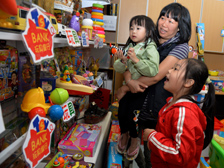
Eager demeanour:
Ms Chan says her girls are excited every time they visit the Toy Bank.
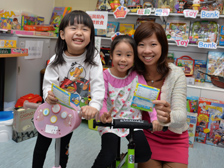
Rewarding scheme:
Cynthia Pao says the Toy Bank concept gives children recognition for their good deeds.
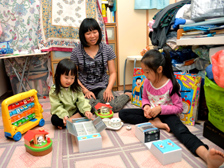
Better parenting:
Ms Chan's daughters have claimed almost 50 toys so far, by behaving well over the last two years.
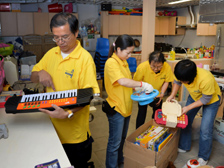
Quality control:
Volunteers check and clean donated toys before making them available to Toy Bank members.
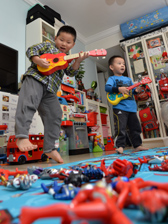
Full of fun:
Oliver and Cedric have many toys scattered around their home.
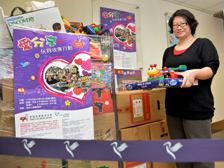
Sharing is caring:
Ellen Chan donates toys her sons no longer use.
Post offices promote 'toy banking'
December 01, 2013
No child can say 'no' to a toy. For children from low-income families, to have some toys is their greatest wish. To make these wishes come true, parents can show their children it is better to give than receive, by donating toys to the YMCA's Toy Bank.
Hongkong Post has partnered with the YMCA to host the Love to Share, Toys Collection Programme, which is accepting toys from donors at 14
designated post offices until December 31. The toys are passed on to children in need.
Ms Chan is a single mother raising two daughters, aged three and five. The girls opened a Toy Bank account and were given a bankbook that has a list of resolutions, such as good behaviour goals. If they meet these targets, they can get a toy from the Toy Bank once a month.
"We do not have much money to buy toys, but we are lucky to have Toy Bank where my girls can play with toys, and take one home,” Ms Chan said, adding the girls are excited every time they visit the Toy Bank, and spend hours browsing the toys and making a selection.
The girls have claimed almost 50 toys so far, by behaving well over the last two years.
Cynthia Pao runs the Toy Bank in the YMCA's Tung Chung Centre. She said the Toy Bank concept is a positive and educational way of giving children recognition for their good deeds.
"We do not just give handouts to low-income families," she said. "We let the children know they are able to pick a toy for themselves because they performed well. The toy is a reward."
Love to share
Donors also gain from the Toy Bank programme.
Oliver and Cedric, aged five and three, are crazy about toys. They have scores of playthings scattered all over their home. Most were given by relatives.
The lucky boys’ mother Ellen Chan, a schoolteacher, wants to educate her sons on the importance of sharing.
“When I asked my sons to donate some of their toys, they over-reacted. Especially the younger son. He could not accept his toys being taken away, and kept yelling loudly.”
She patiently explained to her boys they had too many toys, and some were no longer used. Wanting them to know they are fortunate, she eventually persuaded them to bring some toys to the collecting point at a nearby post office.
“They can now treasure what they have, and share toys and happiness with other children in need,” she said.
Overwhelming response
Since its 2009 launch, the Toy Bank campaign has delivered 20,000 toys to more than 2,000 children from low-income families.
Ms Pao said the response has been very good, with more than 40,000 toys collected so far by Hongkong Post, some of them brand-new.
Volunteers check and clean the toys before making them available to Toy Bank members.
Toys for donation should look at least 80% new, be clean and function well. They should be packed properly with their accessories. Stuffed or fragile toys, and those containing chemicals, or those that do not comply with safety standards, or are in poor taste, are not accepted.